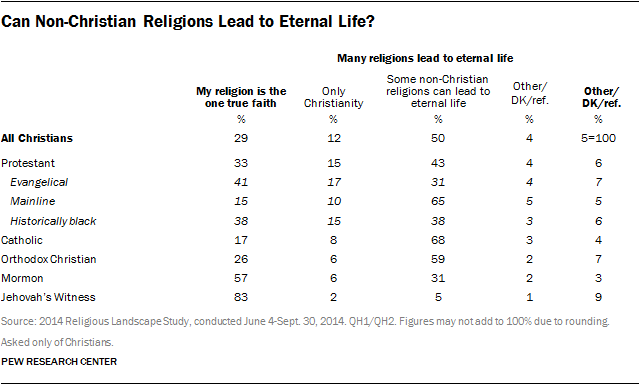While America’s “nones” keep losing their faith, a significant study finds that religious Americans are staying stable—and by some measures, even growing—in theirs.
“Among the roughly three-quarters of US adults who do claim a religion, there has been no discernible drop in most measures of religious commitment,” concludes the Pew Research Center in its latest report. “Indeed, by some conventional measures religiously affiliated Americans are, on average, even more devout than they were a few years ago.”

The report is the second half of the 2014 US Religious Landscape Study, an attempt by Pew to address the problem that the main methods for measuring American faith are flawed. The seven-year study was designed to “fill the gap” left by the United States census (no questions on religion), the self-reporting of denominations (“widely differing criteria”), and smaller surveys (too few questions or people).
While most surveys rely on sample sizes of 1,000 or 2,000 people, Pew interviewed 35,000 adults in English and Spanish in 2007 and again in 2014 for the landscape study.
CT covered the first half of the results in May, which found that evangelicals stayed strong while Christianity crumbled in America.
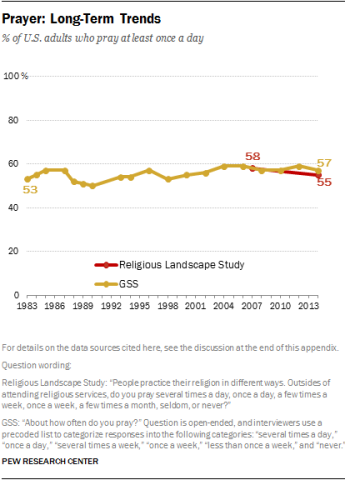
Here are the new highlights of how American religion has changed from 2007 to 2014:
According to Pew, 70 percent of the religiously unaffiliated believed in God in 2007. By 2014, just 61 percent did. The nones were also slightly less likely in 2014 to pray daily (20% vs. 22%) and to say religion was very important to them (13% vs. 16%) than they were in 2007. (The survey's margin of error for the religiously unaffiliated: ±1.4%.)
Given that the nones are now 23 percent of the US population (up from 16% in 2007), it is their drop in belief that drags down the numbers for American religiosity overall, the study’s authors said.
Otherwise, religious Americans have largely stayed the course. Of the 77 percent of religiously affiliated Americans, nearly all (97%) believe in God, the same percentage that believed in 2007. And a stable majority of approximately two-thirds in both 2007 and 2014 reported that religion was very important to them, they pray daily, and they attend religious services at least once or twice a month.
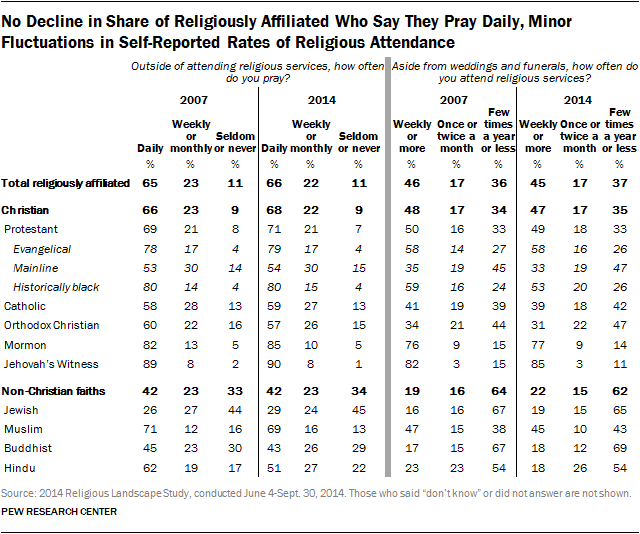
Among evangelicals, the numbers are even stronger. Approximately 8 in 10 said their faith was very important to them in 2007 and 2014. The same percentage reported praying daily in 2014, up slightly from 78 percent in 2007. (Margin of error for evangelicals: ±1.3%.)
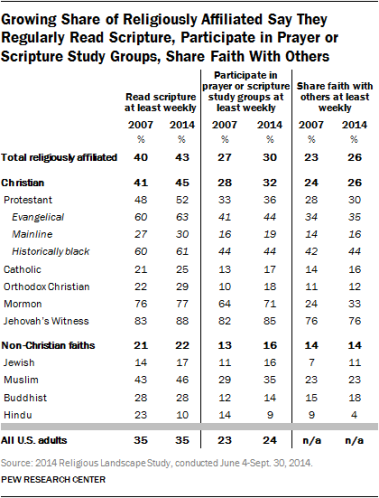
Evangelicals are also slightly more likely to report reading Scripture at least weekly (63% in 2014 vs. 60% in 2007), participating in a weekly prayer or Bible study group (44% vs. 41%), and sharing their faith with others at least weekly (35% vs. 34%).
Historically black Protestants are even firmer in their faith: In both 2007 and 2014, 85 percent said their faith was very important to them, and 8 in 10 prayed every day. (Margin of error for historically black Protestants: ±2.7%.)
They looked largely the same as evangelicals on reading Scripture at least weekly (61% in 2014 vs. 60% in 2007) and participating in a prayer or Bible study group (44% for both years). They were more likely to report sharing their faith (44%, up from 42% in 2007). (Two-thirds of black Protestants identify as evangelicals, according to past surveys by Pew; however, this survey categorized respondents by denominational affiliation, not self-identification.)
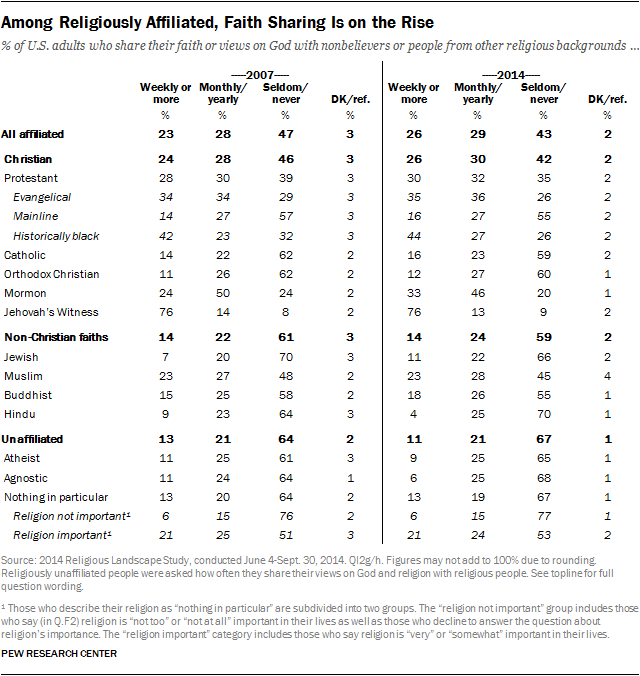
Pew also found some ways that Americans overall are becoming more "spiritual." The number of adults who regularly feel spiritual peace and well-being is up from 52 percent in 2007 to 59 percent in 2014 (margin of error for all Americans: ±0.6%), and evangelicals are no exception. Three-quarters of evangelicals feel a deep sense of spiritual peace at least once a week, up from 68 percent in 2007. So do three-quarters of historically black Protestants: 73 percent reported feeling a deep spiritual well-being at least once a week in 2014, compared with 65 percent in 2007.
Along with peace, Americans are more likely to feel a sense of wonder about the universe (46%, up from 39% in 2007). About 4 in 10 evangelicals (41%) felt wonder at least weekly in 2007; now nearly half (48%) do. Historically black Protestants are also more likely to report feeling amazed by the universe (42%, up from 37%).

For the first time, Pew included questions about gratitude and the meaning of life. A solid majority (78%) said they feel a strong sense of thankfulness at least once a week, including 87 percent of evangelicals and 85 percent of historically black Protestants.
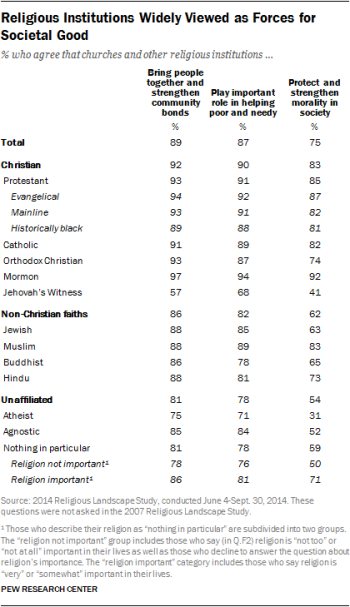
In addition, more than half of Americans (55%) said they think about the meaning of life at least once a week. Evangelicals think about it even more: 64 percent of evangelicals and 72 percent of historically black Protestants said they thought about the purpose of life weekly or more.
Additional findings from the study:
- Even if they don’t like attending, Americans like church. Almost 9 in 10 (89%) said churches bring people together and strengthen community bonds. Slightly less (87%) said the church plays an important role in helping the poor and needy, and three-quarters said the church protects and strengthens morality in society.
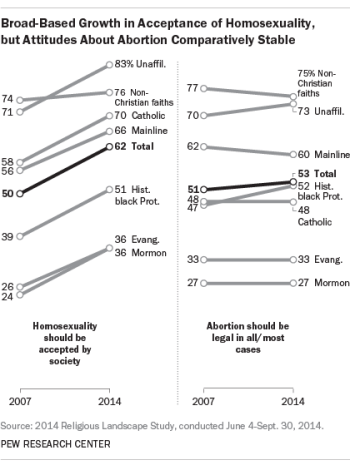
- Views shifted toward acceptance of homosexuality in every religious category, including evangelicals. More than a third of evangelicals (36%) in 2014 said homosexuality should be accepted by society, up sharply from a quarter (26%) in 2007. And more than half of historically black Protestants (51%) in 2014 also said homosexuality should be accepted, up from two in five (39%) in 2007.
- America’s views on abortion, however, are not changing. About half feel that abortion should be legal in all or most cases (53%, up from 51%). While evangelical opinion hasn’t budged (33%), black Protestants became more in favor (52%, up from 47%).

- Among evangelicals, 4 out of 5 (80%) believe God is a person with whom people can have a relationship, while 14 percent said he’s an impersonal force. Fewer black Protestants said God was a person (70%) and more said he was an impersonal force (22%).
- About 9 in 10 evangelicals (88%) and black Protestants (93%) believe in heaven; fewer (82% of both) believe in hell.

- The majority of evangelicals want their church or denomination to preserve its traditional beliefs and practices (61% evangelicals, 53% black Protestants). A quarter of both evangelicals and black Protestants said they wouldn’t mind if their church adjusted its traditional beliefs and practices, and a minority (8% of evangelicals, 13% of black Protestants) wanted their church to adopt modern beliefs and practices.

- About half of evangelicals (52%, down from 57%) and black Protestants (57%, down from 59%) said that many religions can lead to eternal life. More than 3 in 10 evangelicals (31%) and black Protestants (38%) allowed that some non-Christian religions can lead to eternal life.
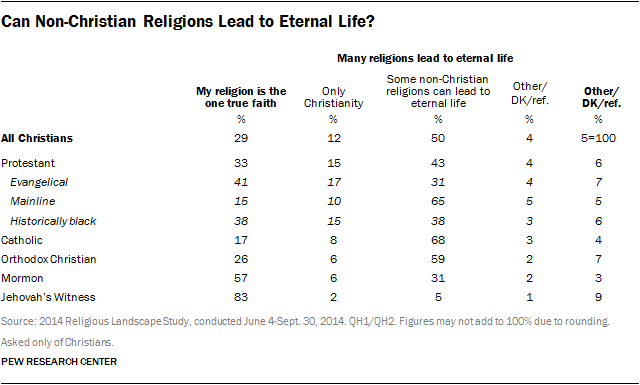
- Six in 10 evangelicals (60%) are likely to look to religion for guidance on questions of right and wrong, compared with almost two in five (39%) who rely on common sense. Black Protestants are more likely (47%) to rely on religion than in 2007 (43%), and less likely to look to common sense than religion (41%, compared to 47%) when looking for similar guidance.
- Black Protestants are far more likely than evangelicals to say that what is right or wrong depends on the situation (68%, compared to 48%) than on absolute standards (29%, compared to 50%).
- Evangelicals are just as likely to attend church weekly (58%) in 2007 as they were in 2014, while black Protestants are less likely to go weekly (53%, down from 59%) and more likely to go monthly or yearly (36%, up from 29%).
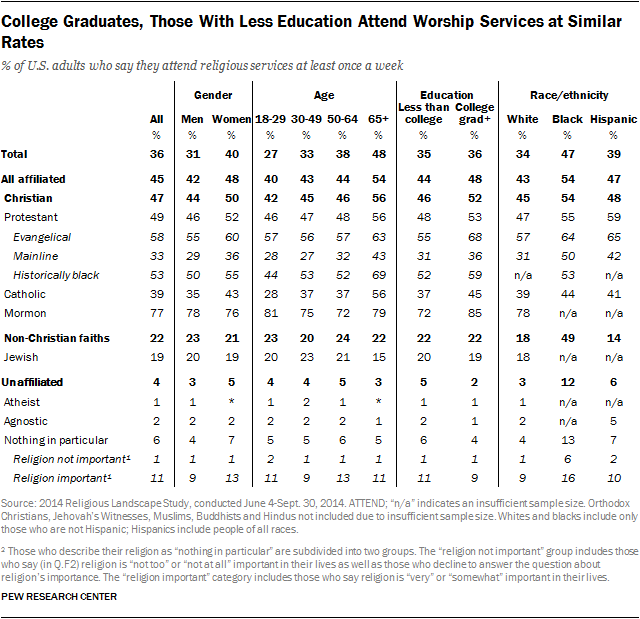
- Black Protestants are slightly more likely to speak in tongues (17%, up from 14%). Evangelicals held steady at 11 percent.

- Not quite 1 in 6 evangelicals (58%) said that having more women in the workforce has been a change for the better, compared with nearly 1 in 7 black Protestants (69%).
- Nearly three quarters of evangelicals (73%) said society’s trend of having more children out of wedlock was for the worse, compared with 55 percent of black Protestants. Only 21 percent of evangelicals said it didn’t make much difference, compared with 35 percent of black Protestants.
- Almost half of evangelicals (48%) said that a growing population of immigrants has been a change for the worse, compared with a quarter of black Protestants. More than 4 in 10 black Protestants (42%) said the trend didn’t make much difference, compared to a quarter of evangelicals.
CT has covered many Pew reports, including how evangelicals convert outsiders and retain kids, the best prediction yet of how Christianity and Islam will look in 2050, and how scores of Catholics in Latin America are converting to Protestantism. Ed Stetzer blogged on how Christians should understand the data in Pew's Religious Landscape Study.
[Image courtesy of peasap – Flickr]













